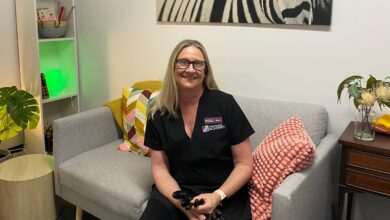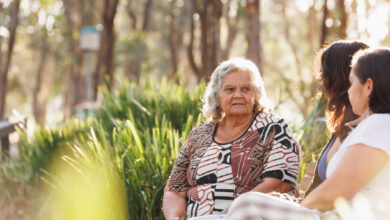Older life is in the transitions – Opinion

Bruce Fieler in his New York Times bestseller, Life is in the Transitions, tells us that by the time we turn 65, we will have experienced 30 to 40 life disruptors.
Mostly, we’ll take these in our stride. But three to five of them will morph into “lifequakes”; curve balls that will throw our ordered linear lives into disarray from which we might never recover. Or certainly never be the same.
He tells us that it takes about five years to get through one of these. Which means, at best, half our mid-life could be spent in the messy business of dealing with lifequakes.
But what happens after 65?
We found that it was impossible to talk to older people without hearing about their multiple lifequakes, such as:
- the end of working life, lack of opportunity and paths to opportunity; redundancy, boredom, loss of purpose;
- new freedoms, flexibility, time to pursue interests, new opportunities;
- shrinking networks, divorce, death of family and friends, isolation and loneliness;
- illness, injury and poor health, depression;
- loss of driver’s licence, reduced mobility;
- loss of income, financial disaster and poverty;
- reputation damage, being cast into negative roles and being imaged as deviant;
- downsizing, multiple house moves, loss of possessions and pets, loss of routines and structures;
- loss of autonomy, choice, control, rights and citizenship;
- lingering frailty, dementia and dementia care, dependence and clienthood;
- institutionalisation;
- abuse and neglect, death-hastening and suicide.
We were dismayed by the sheer number of lifequakes. And while some are new opportunities, most are very damaging.
It seemed to us that the older we get, the more lifequakes we have.
After 65, most of us are likely to be permanently lifequaking – probably experiencing several simultaneously, and never getting the five years needed to sort them out.
No wonder modern ageing is such a disappointment or disaster for so many.
But, Fieler says, we can learn the skills to transition through lifequakes; embracing the opportunities that they present.
He lays out the seven skills that we are going to need – accepting, marking, shedding, creating, sharing, launching, and telling.
His stories show us that learning and applying these skills doesn’t come easily but it can be life-changing.
We did find some older people working out how to transition through their lifequakes.
They were curious, adventurous, having none of the ageist narrative and were working out new lives for themselves. Volunteers, artists, grandparents, grey nomads, bike riders, social enterprises, community leaders, coaches, and contributors.
However, we mostly found that older people seem to get stuck somewhere in the transition journey. And that this can be anywhere along three stages that Fieler identifies:
- the long goodbye
- the messy middle
- the new beginnings
We found people living the “long goodbye” for years. Or moving from one “long goodbye” to another as lifequakes came at them thick and fast. Like retired athletes holding on to past glories.
But we also found people who were happy to farewell their mid-lives – then got stuck in the “messy middle” like a never-ending gap year with no way out.
We were most surprised at the number of people we found stuck in the “new beginnings” like graduates who never find the right job. All dressed up and nowhere to go.
We did find some people who had become good at living stuck, when they can’t see what’s next and suspect they never will.
Mostly, we found people suffering from the lack of opportunity to grow productively and independently.
You would think that upskilling older people to transition through lifequakes would be about as mandatory as schooling is for kids, given that all older people have multiple lifequakes and that they have overwhelming negative impacts on dependency and productivity. Both their's and the country’s.
We did find a few upskilling courses – Mindset for Life, Modern Elder Academy, Holistic Retirement Planning Program, Attitude Clunes, and Hudson Institute – along with a surprising amount of video and published material.
Yet, no upskilling is broadly available and accessible to the masses.
Nor is there a public expectation that we might need it – not from super funds, employer groups, consumer peaks, health and aged care providers, or even the IGR.
Older people told us, time and time again, that they were up for it.
Let's have a look at what else they told us. They recognised that many lifequakes weren’t a natural result of ageing, but were imposed on them by others because they were old. And as the number of lifequakes had increased, so did the imposing.
What we’re seeing here is the real impact of holding ageist beliefs. Beliefs that older people are incompetent, sick, slow, unproductive, boring, dependent, dementing, and dying.
This teaches us that older people don’t just get bad things done to them. The bad things become lifequakes that throw their whole lives into disarray.
And for aged care, this is a life-defining distinction. What providers see as a necessary inconvenience to get care, older people experience as a lifequake. If providers do this often enough, it can cause older people to be in a permanent state of lifequake stress disorder.
The Human Rights Commission's report Changing perspectives: testing an ageism intervention, found that there’s not much on offer to help change or challenge our age beliefs.
However, relatively low interventions can be quite effective, which is very encouraging in making the sizable inroads needed to shorten the older lifequake list.
But nothing really changes until mastering the skills to transition through lifequakes becomes the bread and butter of living longer and better.
Mike Rungie specialises in the intersection between good lives and aged care. He is a member of a number of boards and committees, including ACFA, Every Age Counts, and GAP Productive Ageing Committee.
Email: [email protected]





